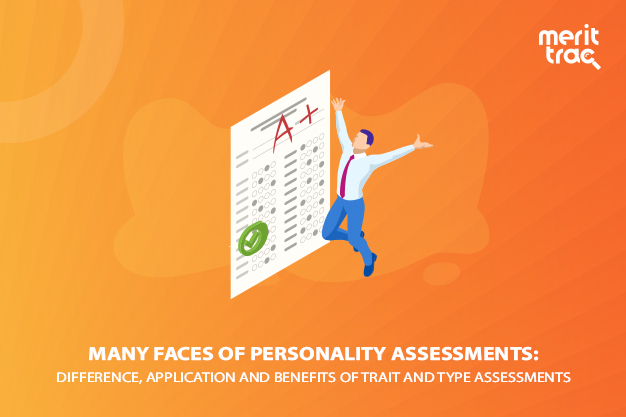
Many Faces of Personality Assessments: Difference, Application and Benefits of Trait and Type Assessments
Date: 19/11/2020 | Posted by: Meghana Jitendra, Psychometrician at MeritTrac Services | Category: Assessment , Behavioural Assessment , Employee Assessment , Hiring
It is very noticeable that personality assessments have become very popular. They are being used not only in corporate hiring and talent management, but also during career guidance, self and personality development endeavours, and in fun online quizzes. Keeping aside the fun internet quizzes on “your favourite Harry Potter character says a lot about your personality”, personality assessments use a variety of approaches to throw light on one’s personality. Thanks to research in Personality Psychology, that has made great progress over decades, assessments of personality are now varied in methodology and focus, distinctly insightful, and catering to multiple objectives of people development.
Personality assessments can be understood as having one of the two broad approaches of measuring personality in psychology: “Personality Trait” approach, and “Personality Type” approach. Simply put, Trait assessments assess the characteristics of an individual that form a personality of an individual.
The “Big 5” theory of personality and “16 personality factors” should ring a bell when we talk about Personality Trait assessments. For example, one person can have some degrees of extraversion, conscientiousness and adaptability, while the other might have different degrees of the same traits.
Ever heard of “MBTI” or “DISC” assessments of personality? Well, these are the “Personality Type” assessments that see people as falling into classifications of distinct types of personalities. For example, you might have an “influencing” type personality, while your friend might have a “dominant” type of personality.
Both of these approaches have their own application, scope and advantages, and this article aims at helping one to fit the right pieces (of assessment) in the right puzzle (of people management and development) and understand which one to use and when to use exactly.
To compare: Use Personality Trait Assessments
Being on a scale, trait assessments allow for easier comparison not only among people, but also between pre-intervention and post-intervention levels of the concerned behavioural competency.
To align with roles and requirements: Use Personality Type Assessments
By understanding distinct personality types, type assessments can be used to align the right personality type to the right role and requirements, so that an “influencing” type personality is not stuck in a data analysis job, rather than flourishing in a sales role.
To map to an existing competency framework: Use Personality Trait Assessments
Components of trait assessments can be easily mapped to different competency frameworks, and can even be used as separate elements.
To see unique strengths: Use Personality Type Assessments
Type assessments highlight the uniqueness of the individual, styles of functioning, and show how different personality aspects interact with each other.
To evaluate levels of strength: Use Personality Trait Assessments
Trait has clear indications of strength, weakness and improvement, since many trait assessments are on standardised scales of measurements. Categorisations such as “high level”, “expert” and “L4” are easily derived from the measurement models of trait assessments.
To mitigate concerns of social desirability: Use Personality Type Assessments
Type has a comparatively lower possibility of socially desirable answers from the respondent, since all response options are equally appealing, and will contribute to understanding the unique strengths of a particular personality type.
To make validation easy: Use Personality Trait Assessments
Type assessments are difficult to validate and compare because of the nature of the approach. In comparison trait assessments are easy to validate and compare, because of their scale measurements, making it easy to run multiple analysis with different kinds of data points.
Personality assessments can give significant insights to take a proper hiring decision in a corporate organisation. It is equally important to know which assessment can help better understand what one wants to know.
Since the organisations have resumed their hiring after a slowdown due to COVID-19 outbreak and resultant lockdown, choosing a suitable assessment yields the best result because the new normal is different from pre-pandemic stage. Now the majority of the employees are working from home and remote onboarding is the most accepted form of hiring. Hence, assessing the candidates’ capabilities can only be done through digital solutions.
Solution from MeritTrac
As part of its two decades of assessment support provided to the corporate world, MeritTrac, India’s leading assessment company, has launched BackOnTrac assessment package to help you kickstart your hiring plans. The package includes 20 assessments – 10 Psychometric & 10 Cognitive Assessments – and offers at a rock bottom price of INR 2020. These assessments are ideal for startups and SMEs and can be administered immediately with no support!
Try this limited period offer TODAY!
About the author
Meghana J is the Psychometrician at MeritTrac services, specialising in personality and behavioural assessment development. Her interest in psychology and people development only narrowly beats her love for literature.












 Sales Hotline: USA: +1 646 916 0939 / Others: +91 80619 14700
Sales Hotline: USA: +1 646 916 0939 / Others: +91 80619 14700


